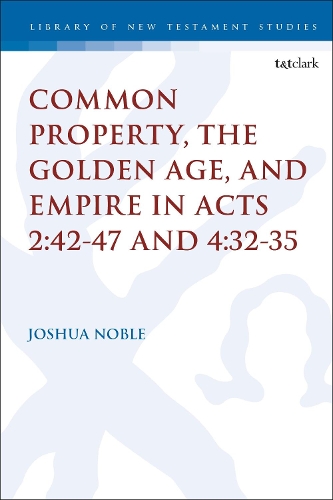
Common Property, the Golden Age, and Empire in Acts 2:42-47 and 4:32-35
(Hardback)
Available Formats
Publishing Details
Common Property, the Golden Age, and Empire in Acts 2:42-47 and 4:32-35
By (Author) Dr. Joshua Noble
Bloomsbury Publishing PLC
T.& T.Clark Ltd
15th October 2020
United Kingdom
Classifications
Tertiary Education
Non Fiction
Criticism and exegesis of sacred texts
226.6067
Physical Properties
Hardback
208
Width 156mm, Height 234mm
463g
Description
Joshua Noble focuses on the rapid appearance and disappearance in Acts 2 and 4 of the motif that early believers hold all their property in common, and argues that these descriptions function as allusions to the Golden Age myth. Noble suggests Lukes claims that the believers had all things in common and that no one claimed private ownership of any possessionsa motif that does not appear in any biblical source rather calls to mind Greek and Roman traditions that the earliest humans lived in utopian conditions, when no one possessed any private property, but all things were common. By analyzing sources from Greek, Latin, Jewish, and Christian traditions, and reading Acts 2:42-47 and 4:32-35 as Golden Age allusions, Noble illustrates how Lukes use of the motif of common property is significant for understanding his attitude toward the Roman Empire. Noble suggests that Lukes appeal to this myth accomplishes two things: it characterizes the coming of the Spirit as marking the beginning of a new age, the start of a universal restoration that will find its completion at the Second Coming of Christ; and it creates a contrast between Christ, who has actually brought about this restoration, and the emperors of Rome, who were serially credited with inaugurating a new Golden Age.
Reviews
Noble presents an interesting and engaging thesis, creating an interpretive context that has largely been unexplored by Lukan scholars, and which hopefully will lead to fruitful discussions concerning the communal sharing of the earliest believers in Jesus for years to come. * Journal of Gospels and Acts Research *
Author Bio
Joshua Noble is a tutor at Thomas Aquinas College, USA.
